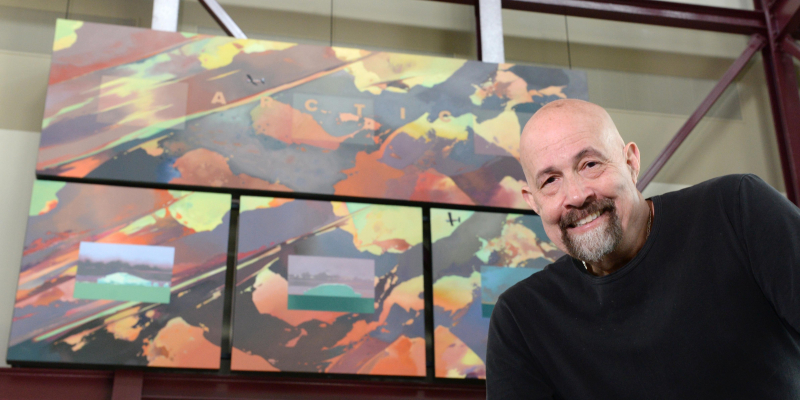Installation Connects Art and Climate Research
Internationally acclaimed artist and sculptor K.A. Colorado donated some of his climate-inspired artwork to the University of Northern British Columbia’s Northern Leadership Campaign where he knows it will strengthen research and teaching excellence on the science surrounding climate change.

K.A. Colorado has found a home for his masterpieces.
The internationally acclaimed artist and sculptor donated some of his climate-inspired artwork to the University of Northern British Columbia’s Northern Leadership Campaign where he knows it will strengthen research and teaching excellence on the science surrounding climate change.
“I was searching for a place that I really thought was representative of a significant relationship to climate,” Colorado says. “I believe in the impact this University is having through community-inspired research.”
Colorado’s connection to UNBC began in Rio Gallegos, a community in southern Argentina near South America’s Patagonia ice fields, where he first met Geography Professor and Canada Research Chair for Glacier Change Dr. Brian Menounos. Colorado had just returned from Antarctica, where he had been invited to create an on-site art sculpture on the Antarctic continent.
The two share a passion for ice, snow and freezing cold temperatures. Through his art, Colorado is able to initiate discussions on the importance of deep cold regions to the planet’s overall climate. Menounos approaches the same basic questions through a scientific lens.
“Art can send a strong message,” Menounos said. “It does not always have to be a fancy graph or a sophisticated equation to get the point across about what the story is about.”
The connection he felt to the UNBC research program is not the only reason Colorado chose to donate his work to the University; the campus locations in Northern British Columbia also played an important symbolic role.
“Northern Canada is fundamental to the question of climate change because there are very few areas and latitudes that are proximate to glacier areas and areas of deep cold,” Colorado said.
“Deep cold has a real mystery and connection to life.”
Colorado’s art now hangs in two locations on the Prince George campus and he hopes his donations will open a path to more artists contributing in the future.
His masterpieces are on display in the Bentley Centre alcove. The three paintings, titled Iceberg with Airplanes, Twin Bergs in Warm Earth and Iceberg in Warm Earth are displayed with two iceberg sculptures, including one dripping with oil.
The atrium of the Teaching and Learning Building features Colorado’s 60 Second Time-Lapse of the World, a massive four-piece installation, which was previously on display in the Portland International Airport.
Cold has been a theme of Colorado’s work for years and his art has been a gateway to academia. In 2006 he presented a paper titled Aesthetic Considerations and Implications of Snow Mass and Texture Changes at the International Conference on Hydrometeorological Security in Moscow, Russia.
“Most people think about heat as a resource, but for me the more important resource is cold,” Colorado says. “Cold is very consequential.”
Menounos says the artwork sends a powerful message and credits UNBC with putting the work on prominent display.
“A University is a place of academic freedom and critical thought,” Menounos says. “Displaying artwork that could be controversial is something a University should be doing.”
Menounos and Colorado have talked about continuing to develop the relationship between the artist and the University, including having Colorado visit with UNBC researchers in the field.
“Over time I believe a lot of people from different countries are going to want to come to UNBC,” Colorado says. “I think it has to do with geography and the Canadian focus on climate.”
Throughout the Northern Leadership Campaign, we will regularly feature stories of how gifts from donors make it possible for UNBC to Educate, Innovate and Lead.
